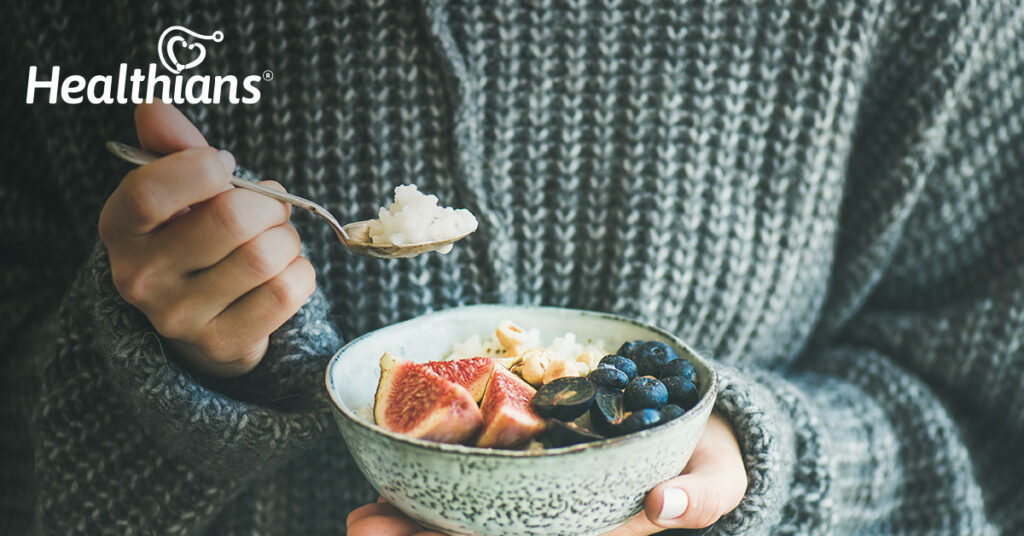Introduction
Winters can be challenging for breastfeeding mothers and their infants. The harsh, dry chilly weather can be harmful to both. This is because the mother and newborn baby are at a greater risk of illness during this time of the year. So, it is critical that breastfeeding mothers should take charge of their health and pay close attention to what they eat.
Making healthy dietary choices can help build your baby’s immune system and also fuel milk production during winter.
In this blog, we have compiled a list of foods that breastfeeding mothers should eat and avoid.
Best winter diet for breastfeeding mothers – 15 Foods to avoid and eat
1. Begin your day right by drinking a large glass of warm water with a generous squeeze of lemon. Warm water stimulates the digestive system, and helps to regulate your bowel movements. Vitamin C from lemons is beneficial to enhance your body’s immunity.
2. Opt warm or room temperature beverages. Eat soups and stews, such as bone broth soup, miso soup, chicken soup and vegetable stew to provide yourself with adequate nutrition while also easing digestion.
3. Ginger and garlic have antiviral and antibacterial properties. Most importantly, it warms the body, so include them in your diet. This aids in the prevention of allergies and infections.
4. According to experts, it is important to include a nutrient-rich mix of healthy vitamins, calcium, iron, omega-3 fatty acids, and potassium that can help increase milk production.
5. Green leafy vegetables, carrots, sweet potatoes, tomatoes, chia seeds, milk, nuts, and fruits such as apricots, avocados, melon, and citrus fruits should all be included in your diet.
6. It is important to include green and leafy vegetables, such as spinach, lettuce, cabbage, and kale, as they contain beneficial nutrients and minerals.

7. Staying hydrated to ensure a regular supply of milk is crucial. Drinking herbal teas like fenugreek or raspberry leaf teas, are likely to increase breast milk production. However, some teas like parsley, sage, black walnut, and lemon balm might also decrease the milk supply, so it is advisable to consult a doctor before consuming these herbs during lactation.
8. Because coughs and colds are common among mothers and babies during the winter, it is best to avoid mucus-forming foods. Cold food, served directly from the refrigerator or freezer, is unhealthy and increases the risk of illness and infection. So, avoid sugary or deep-fried foods as well as fruits like avocados and bananas as these can cause a cough and congestion in low-temperature environments.
9. Include bajra flour in your diet as it is full of calcium, iron, and fibre which are essential for both baby and nursing mother, and also increases lactation.
10. The seeds of fenugreek or methi have calcium that not only stimulates milk production in lactating mothers but also enhances the mother’s milk quality by being rich sources of vitamins A, B, and C.
11. Breastfeeding mothers are often advised to skip eating fish with high levels of methylmercury such as tuna, shark, swordfish, mackerel, and bluefin tuna.
12. Lactating mothers are warned to avoid foods thought to cause colic, gas, diarrhoea, and rashes in the breastfeeding infant.
13. Any raw food can be a source of infection. Consumption of raw foods by nursing mothers does not pose a significant risk to breastfeeding infants, though the mother may become ill from food poisoning.
14. Nuts and seeds are superfoods that have been used for centuries during winters to help to breastfeed mothers, thanks to their high vitamin and mineral content.
15. Avoid processed meals like sausages and quick noodles as well as soft drinks, sweetened beverages, cakes, cookies, and pastries as they tend to be deficient in nutrients.
Final thoughts
The chilly weather during the cold winter months can impact severely on the baby’s and mother’s health. The drop in temperature has an effect on immunity, making the body more susceptible to infections. Breastfeeding mothers should therefore take extra precautions during this season because their health may affect breastfeeding. So, new mothers who breastfeed should stay hydrated, eat warming and nutritious foods, avoid oily, spicy, and sugary foods. They should take precautions such as avoiding venturing out in cold air and maintaining the proper room temperature.




